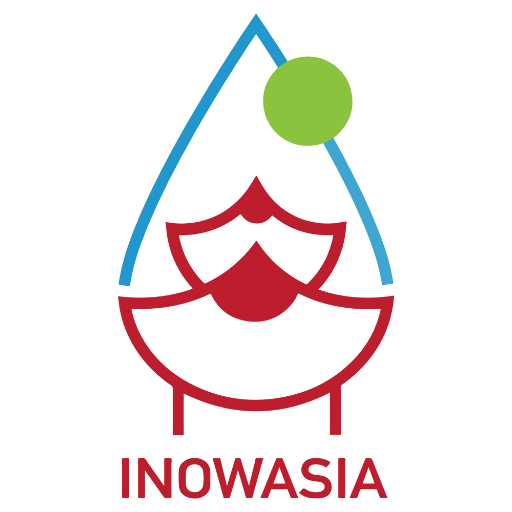

A great chance from #INOWASIA ERASMUS+ project for an international internship in water quality test and other related water Lab
My full name is Nguyen Thi Bach Kim. I am a first year PhD student in Water and Soil Environment at Can Tho University (CTU), Vietnam. I have received a great chance from #INOWASIA ERASMUS+ project for an international internship in water quality test and other related water Lab (#LivingLab, #WLL) at Souphanouvong University (SU), Luang Prabang province, Lao PDR. During my internship, all staffs of Faculty of Agriculture and Forestry Resource of SU, especially my advisor - Mr. Anousith Vannaphon have supported and given me many great chances to improve my lab working skills in water quality analysis.
Up to now, I have taken a campus tour (Environmental Laboratory and campus domestic wastewater treatment system), a Luang Prabang city tour and a training on Internet of Things. After exploring a public domestic wastewater treatment in Mano village, Luang Prabang city, I and Mrs My (a Vietnamese student doing internship in SU at the same time with me), have come up with an idea to do research with great support from my two advisors – Dr. Nguyen Vo Chau Ngan (CTU) and Mr. Anousith Vannaphon (SU).
* Environmental Laboratory
Environmental lab is located at the Faculty of Agriculture and Forestry Resource, SU. This lab has many devices and instruments got through #INOWASIA fund to measure water quality, soil and air quality (Figure 1) for serving Bachelor and Master students to do their research. I have learned and practiced to measure water flow rate, pH, DO, turbidity, BOD and COD.
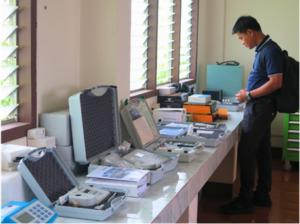
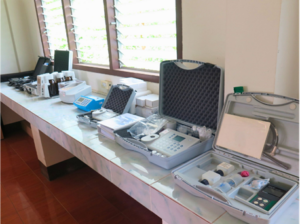
Figure 1. Environmental Laboratory
* Campus wastewater treatment system
Campus wastewater treatment system is located on Campus 1 of Souphanouvong University. It is an open canal system, which is used to treat domestic wastewater as well as to serve as rainfall runoffs. Canals receive domestic wastewater from dormitory, canteen, coffee shop, faculties and office etc. During flow along the canal system, the domestic wastewater is treated by natural processes. The system’s effluent discharges to a pond close to the campus.
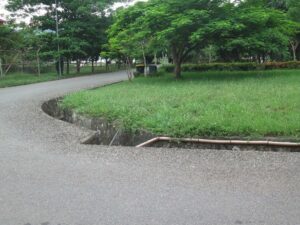
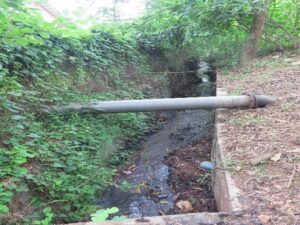
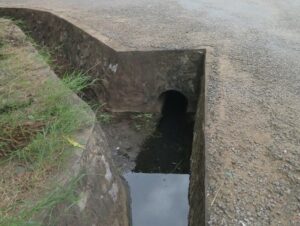
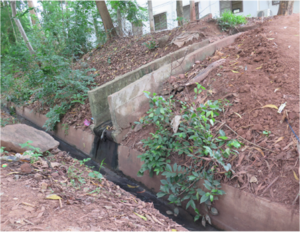
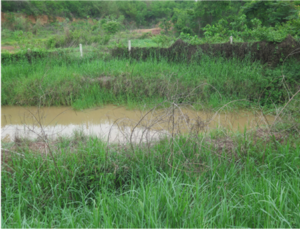
Figure 2. Campus wastewater treatment system
* INOWASIA training on Internet of Things
This training was held at the Faculty of Agriculture and Forestry Resource in SU. It lasted for 2 days on July 3rd and 4th, 2023, set up by the #INOWASIA research team from the University of Toulouse 3 (#UT3). This short training gave an overview of the Internet of Things (the Internet of Things is transforming our physical world into a complex and dynamic system of connected devices on an unprecedented scale). During this training, I have learned how to install and code using Arduino IDE from basics. Also, I have studied how to work with sensors and receive measuring data from a computer.

Figure 3. Training on Internet of Things
* Public domestic wastewater treatment system in Mano village
The public domestic wastewater treatment system in Mano village consists of open canals (drainage) and ponds. The open canals and ponds are connected together. The open canals receive domestic wastewater discharge from households. The ponds were distributed along the open canals. The ponds receive the wastewater from the open canals and stabilize organic material through natural processes involving sunlight, water, nutrients, algae, atmospheric oxygen and bacterial action. Outlet of each pond discharge back to the open canals. Effluence of the domestic wastewater treatment system discharges to the Mekong river.
In August 2022, the domestic wastewater treatment system in Luang Prabang was improved in scope of removing sludge and rip-rap edge of ponds; building drainage system; raising fish in the ponds and installing septic tank at households by JICA project for capacity enhancement for sustainable World Heritage Management and Preservation in Luang Prabang.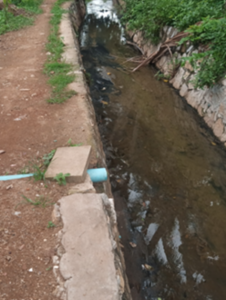
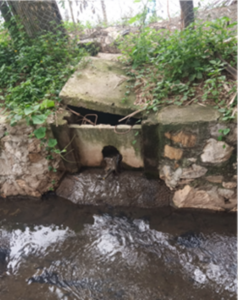
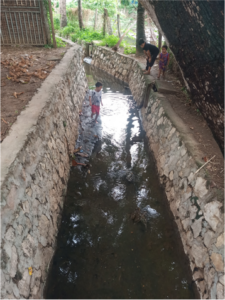
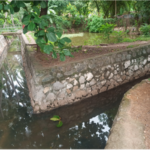
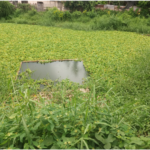
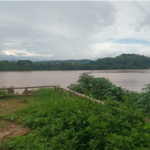
Figure 4. Public domestic wastewater treatment system in Mano village
* Research
We have been conducting research on “Citizens’ satisfaction in the domestic wastewater treatment system in Mano village, Luang Prabang city, Luang Prabang province, Lao PDR”. This study aims to evaluate citizens’ satisfaction in Mano Village in the public domestic wastewater treatment system constructed in Luang Prabang city, Luang Prabang province, Lao PDR for further improvement or development on the public domestic wastewater treatment system in Mano village. In this study, a total of 104 households (74,3% of the total households of Mano village) will be interviewed and will be chosen randomly from the list of 141 heads of households in Mano village. Primary data will be obtained from an opinion, containing 49 questions, classified into 11 constructs, conducted at household level. A head of household will be a representative from each household.
The study’s goals are:
- Specify problems on sanitation, health and business activities of citizens in Mano Village before the public domestic wastewater treatment system was constructed;
- Specify current impacts of the public domestic wastewater treatment system on citizens’ health and business activities;
- Evaluate satisfaction in sanitation, health and business activities of citizens in Mano Village after the public domestic wastewater treatment system was constructed;
- Determine citizens’ activitíe to adapt to current impacts of the public domestic wastewater treatment system on citizens’ health and business activities;
- List citizens’ expectations for improving or developing the public domestic wastewater treatment system in Mano village.
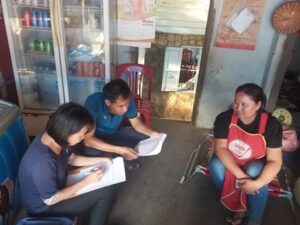
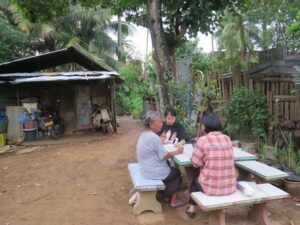
Figure 5. Household interview in Mano village, Luang Prabang province, Lao PDR
Finally, I would like to say thanks to #INOWASIA project for giving me a great chance to do internship in SU; thanks to Dr. Nguyen Vo Chau Ngan (from #CTU) for motivating me and advising me during the internship; thanks to Lou Ackermann (from #UT3) for taking care of my internship process. I really appreciate a great support of all of staffs, especially Mr. Anousith Vannaphon for preparing and arranging everything for me to come and study in Souphanouvong University (#SU).
Web link: https://inowasia.com/su/
INOWASIA is an Erasmus + Capacity Building Higher Education project that promotes a joint action of 11 organisations across 5 countries (Cambodia, Laos, Vietnam, France and Spain) to train a new generation of water professionals in Southeast Asia. More info
This project has been funded with support from the European Commission. This publication reflects the views only of the author, and the Commission cannot be held responsible for any use which may be made of the information contained therein.
Project Number: 619225-EPP-1-2020-1-ES-EPPKA2-CBHE-JP
Let's Talk!
All Rights Reserved by INOWASIA 2021

